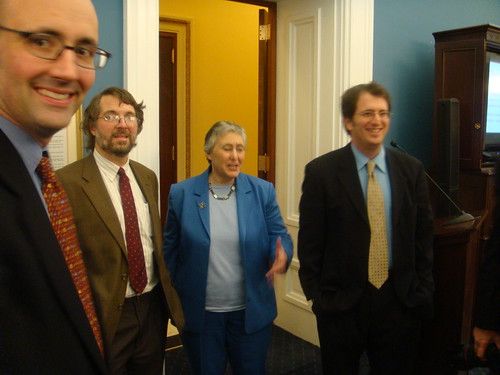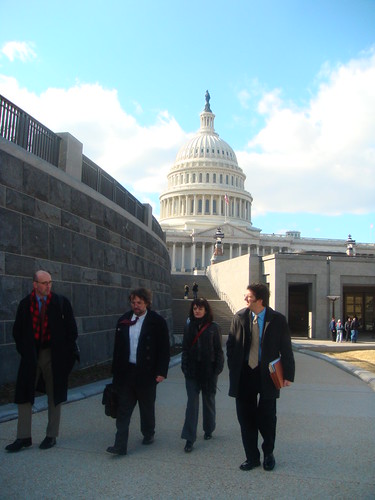The forum entitled "Renters Under Assault: The Hidden Housing Crisis" was part of the Working for Change series hosted monthly by the Community Service Society of New York (CSS), and coordinated by CSS Senior Policy Fellow, Dr. William Spriggs, Chairman of the Department of Economics at Howard University.
Our director, Dean Preston was one of the presenters along with Dr. Spriggs, Deborah Weinstein of the Coalition on Human Needs, Tom Waters, CSS Housing Policy Analyst, and Danilo Pelletiere, Research Director of the National Low Income Housing Coalition.
Dean explained that the impact of foreclosures on tenants is the "most overlooked aspect of the mortgage crisis." He gave an overview of California tenants' rights in foreclosure situations and highlighted some of the difficulties experienced by tenants in these properties, including severe habitability problems, harassment and unjust evictions.
He also explained how predatory landlords such as Page Mill Properties (East Palo Alto) and Lembi Group (San Francisco) fit into the current picture. These landlords acquired rental properties at prices not justified by the actual rental income, but instead based on speculative future uses of the property that involved driving out low-rent tenants. With tenants fighting back and the real estate and credit markets in chaos, these predatory landlords are now stuck with overleveraged properties. (For example, the Lembi Group in San Francisco had to deed back 51 of its apartment buildings to the lender in recent weeks.) While noting the importance of avoiding foreclosure of renter-occupied properties, Dean cautioned that any attempt to assist landlords avoid foreclosure must not to bail out or encourage predatory landlord conduct.
Tom Waters spoke about the dire situation with predatory landlords in New York City. CCS, along with the Urban Homesteading Assistance Board (UHAB), Tenant and Neighbors, and others have been at the forefront of efforts in New York to identify and expose predatory equity schemes and to create legislative solutions to prevent them. He set forth a proposed framework for the Obama administration to use in dealing with overleveraged, multi-family rental properties.
Danilo Pelletiere, author of a comprehensive report on the impact nationally of foreclosures on renters explained that some 20% of properties in foreclosure are rentals and, due to the fact that many of these properties are multifamily, a minimum of 40% of the families affected by foreclosures are renters. Danilo also explained that the NLIHC was backing proposals to strengthen protection for section 8 tenants in foreclosed properties and require 90-days notice for evictions of renters after foreclosure.
Many congressional offices and national organizations working on housing issues were represented at the forum.
Tenants Together greatly appreciates CSS's work in putting this forum together and including Tenants Together as one of the panelists at the forum. We look forward to continuing to work with our allies in New York, Washington D.C. and other parts of the country on these crucial issues. Below are some photos from our visit to D.C.

(Left to Right) Danilo Pelletiere, Tom Waters, Deborah Weinstein, and Dean Preston




Dont forget the destabilizing effect of institutional growth on communities nationwide.. examples are NYU and Stuysevant Town, Columbia University and Harlem, UC Berkeley, Stanford Univ. and of course my personal favorite SFSU/CSU on Parkmerced, SF California. The lack of mandated "fair-share" payments and inclusion of community organizations in negotiations with city officials in MOU's *(Memorandums of Understanding) is a method of circumvention of the impacts on rental housing for families, seniors, and the disabled in urban areas.
ReplyDelete